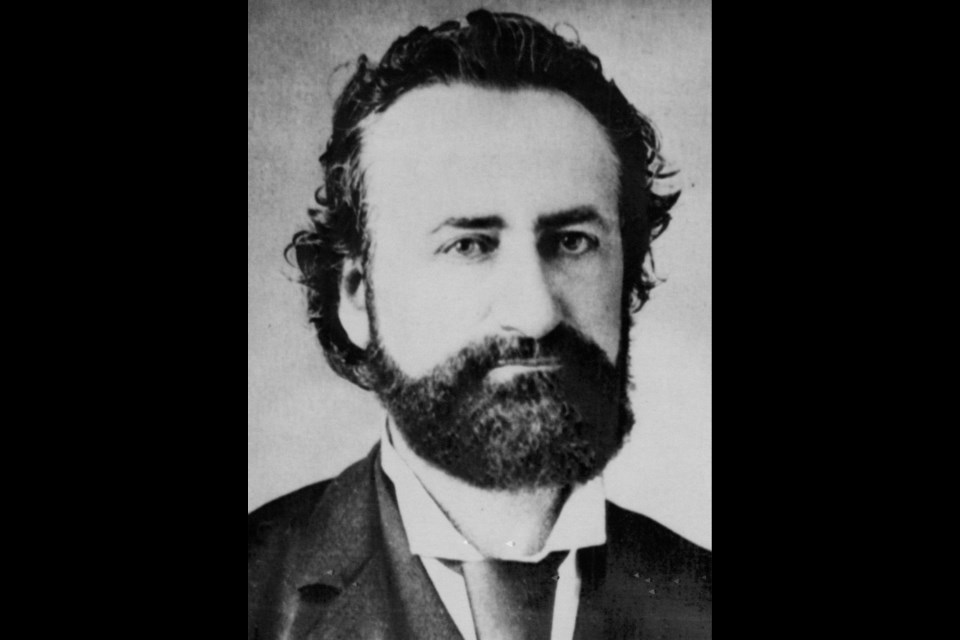He was born William Alexander Smith in Nova Scotia and became a legend in British Columbia, but he made a name for himself — quite literally — when he was in California.
Smith was working as a photographer in the state’s gold fields when he tired of the trouble the post office had making sure he received the letters addressed to him, and not one of the other William Smiths.
So he submitted a petition to the California state legislature seeking a new name.
“I desire not to adopt the name Amor De Cosmos because it smacks of a foreign title, but because it is an unusual name, and its meaning tells what I love mostly, viz: love of order, beauty, the world, the universe,” Smith (or De Cosmos, if you prefer) said in his petition.
Soon after adopting the new name, De Cosmos headed north, arriving in Victoria in the spring of 1858. Within a few months, he became critical of the government under James Douglas, and vowed to fight Douglas by starting a newspaper.
That publication, whose first edition came off the press on Dec. 11, 1858, was the British Colonist — the predecessor of today’s Times Colonist.
De Cosmos sold his stake in the Colonist just five years later, when he entered politics and became the leader of the drive to bring B.C. into Confederation. He served as a member of the B.C. legislature and as an MP. He was our second premier, serving from 1872 to 1874. By the time he died in 1897, he had, by all accounts, lost his mind.
He was born on Aug. 20, 1825, in Windsor, N.S., where he attended a private school and then Windsor Academy until age 15. The family moved to Halifax and Smith became a grocery clerk.
In 1851, he set off for California in a wagon train through the United States.
He stopped at Salt Lake City for a time before the Latter-Day Saints ordered him to move on, and he completed his trip to Mud Springs, California, in 1853.
After adopting his new name, De Cosmos continued to take photographs of miners, but also worked as a trader and speculator.
His move to Victoria made sense, because in early 1858 the city was booming as a result of the gold rush on the Fraser River.
His California chum Fred Sylvester followed some months later and found “our old friend Amor De Cosmos had come here in April pretty well broke, but you all know how clever he was.”
“De Cosmos persuaded Capt. Reid that he wished to establish a salmon saltery here and got a lease from him of all the land between Reid’s store and where Ship Inn stands for $72 per year.”
Sylvester leased 15 feet of that property from De Cosmos for $100 a month, and De Cosmos quickly sublet the rest of his property for a good profit.
De Cosmos was now establishing himself as a presence and declared this was “the age of a free press, free trade and freedom.” He was a staunch economic nationalist who demanded protection for local industry and government aid to business.
He bought a hand-press imported from France, and in a leaky shack on Wharf Street started the British Colonist.
De Cosmos’s attacks on Douglas and the establishment made him a local hero.
It was “an independent paper, the organ of no clique nor party; a true index of public opinion,” he declared in an editorial in the first edition.
By the second edition, De Cosmos was calling for reform of the legislature and there was a letter to the editor from “Britisher” attacking a new tax Douglas had imposed.
By the third edition, the gloves were off and Douglas was De Cosmos’s sole target.
The governor responded by invoking a British law requiring a paper to post an 800-pound bond or face a fine. De Cosmos heard of the law just as the presses were ready to roll and the paper came out with two blank pages. The people of Victoria did not let the editor down, though: They raised the 800-pound bond, and the Colonist was back on the street.
In 1863, De Cosmos decided to dedicate himself to politics and sold his paper to his employees.
He had already failed in one attempt to win a seat in the legislature, but with more time, he was finally elected in 1863. His platform was joining the rest of the colonies in opposition to the government clique and American annexationists. He wanted a strong Canada, independent from England.
He started the Standard newspaper in 1870 and did battle with his old Colonist for three years.
He won, with concessions, B.C.’s entry into Confederation in 1871 and was elected as the Victoria representative to the House of Commons while still holding his seat in the new B.C. legislature.
In 1872, while still an MP, De Cosmos was elected premier of B.C. and held the post for two years until dual representation was abolished. De Cosmos stayed an MP until 1882, when he retired at 57.
His popularity waned over time, and he exhibited increasingly erratic behaviour. He would break into tears while speaking or hit people with his walking stick for no reason. Once, with his umbrella, he beat Mayor R.P. Rithet over the head on a street corner.
An 1895 bid for election failed and in that year, after a brief illness, De Cosmos was declared “of unsound mind.”
He died on July 4, 1897, at the age of 71. Few took the time to attend his funeral.



